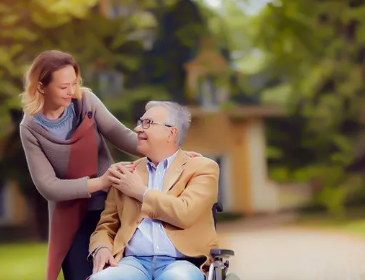Supporting Aging Loved Ones: The Importance of Quality Elderly Care

Introduction
As our loved ones age, their needs change, often requiring additional support and care. Ensuring they receive quality elderly care is crucial for their well-being, dignity, and quality of life. This guide delves into the importance of elderly care, explores different care options, and provides tips for choosing the best care for your aging loved ones.
Understanding Elderly Care
What is Elderly Care?
Elderly care, also known as senior care or elder care, encompasses a range of services designed to meet the unique needs of older adults. These services can include medical care, personal care, companionship, and support with daily activities.
Types of Elderly Care
- In-Home Care: Care provided in the senior’s own home, including assistance with daily activities, medical care, and companionship.
- Assisted Living: Residential facilities that offer support with daily activities and healthcare services in a community setting.
- Nursing Homes: Facilities providing 24/7 medical care and supervision for seniors with significant health issues.
- Adult Day Care: Daytime programs that offer social activities, meals, and limited health services.
- Hospice Care: Specialized care for those with terminal illnesses, focusing on comfort and quality of life.
Benefits of Quality Elderly Care
Enhanced Quality of Life
Quality care ensures that seniors can live comfortably and safely, with their physical, emotional, and social needs met.
Health and Safety
Professional caregivers can monitor health conditions, manage medications, and provide necessary medical care, reducing the risk of complications.
Independence and Dignity
Support with daily activities allows seniors to maintain a level of independence and dignity, enhancing their self-esteem and overall well-being.
Emotional Support
Companionship and emotional support from caregivers help reduce feelings of loneliness and isolation, improving mental health.
Peace of Mind for Families
Knowing that their loved ones are well cared for provides peace of mind to families, allowing them to focus on their own responsibilities.
Choosing the Right Elderly Care
Assessing Needs
Evaluate the specific needs of your loved one, including medical requirements, personal care needs, and preferences for social activities.
Researching Care Options
Explore different care options available in your area, considering factors such as services offered, staff qualifications, and facility reputation.
Evaluating Care Providers
Check the credentials and experience of caregivers or care facilities. Look for reviews, testimonials, and accreditation from reputable organizations.
Considering Cost and Insurance
Understand the costs associated with different types of care and explore insurance options, government programs, and financial assistance that may be available.
Involving Your Loved One
Involve your loved one in the decision-making process to ensure their preferences and comfort are prioritized.
Key Components of Quality Elderly Care
Personalized Care Plans
Quality care should be tailored to meet the unique needs and preferences of each individual, with personalized care plans developed in consultation with the senior and their family.
Qualified and Compassionate Staff
Caregivers should be well-trained, experienced, and compassionate, providing not only professional care but also emotional support.
Safe and Comfortable Environment
Whether care is provided at home or in a facility, the environment should be safe, clean, and comfortable, promoting the senior’s well-being.
Social and Recreational Activities
Engaging in social and recreational activities helps seniors stay active, connected, and mentally stimulated.
Social Isolation and Loneliness
Social isolation and loneliness are common concerns among aging individuals, especially those who live alone or have limited social support networks.
Regular Health Monitoring
Routine health checks and monitoring ensure that any changes in health are promptly addressed, preventing complications and promoting overall health.
Challenges in Elderly Care
Caregiver Burnout
Family members providing care can experience burnout due to the physical and emotional demands. It’s important to seek support and respite care when needed.
Financial Strain
The cost of quality elderly care can be significant. Planning ahead and exploring financial assistance options is crucial.
Emotional Stress
Seeing a loved one age and decline in health can be emotionally challenging. Support groups and counseling can provide emotional relief.
Finding the Right Fit
It can be difficult to find the perfect care solution that meets all the needs and preferences of your loved one. Patience and thorough research are key.
Tips for Providing Elderly Care at Home
Create a Safe Living Space
Ensure the home is safe by removing tripping hazards, installing grab bars, and ensuring adequate lighting.
Establish a Routine
A consistent routine helps seniors feel secure and can improve their physical and mental well-being.
Stay Organized
Keep track of medical appointments, medications, and care schedules to ensure all needs are met.
Encourage Independence
Support your loved one in maintaining independence by encouraging them to do as much as they can safely.
Take Care of Yourself
Caregiving can be demanding. Make sure to take time for self-care and seek support when needed.
FAQs
What are the signs that an elderly person needs professional care?
Signs include difficulty with daily activities, frequent falls, neglect of personal hygiene, memory loss, and worsening medical conditions.
How can I afford quality elderly care?
Explore options such as long-term care insurance, government programs, and financial assistance from non-profit organizations.
Can elderly care be provided at home?
Yes, in-home care services can provide medical and personal care, allowing seniors to stay in their own homes.
How do I choose between assisted living and a nursing home?
Consider the level of care needed. Assisted living is suitable for those who need help with daily activities but do not require intensive medical care, while nursing homes offer 24/7 medical care.
What should I look for in a caregiver?
Look for qualifications, experience, compassion, and positive references or reviews.
How can I support a caregiver in my family?
Offer help with caregiving tasks, provide emotional support, and encourage them to take breaks and practice self-care.
Conclusion
Quality elderly care is essential for supporting the health, dignity, and happiness of aging loved ones. By understanding the different care options, assessing individual needs, and choosing the right care providers, you can ensure your loved ones receive the best possible care. Whether opting for in-home care, assisted living, or nursing homes, the goal is to enhance their quality of life and provide peace of mind for the entire family. If you’re interested in finding out more about aged home care services make sure you check out Let’s Get Care.






